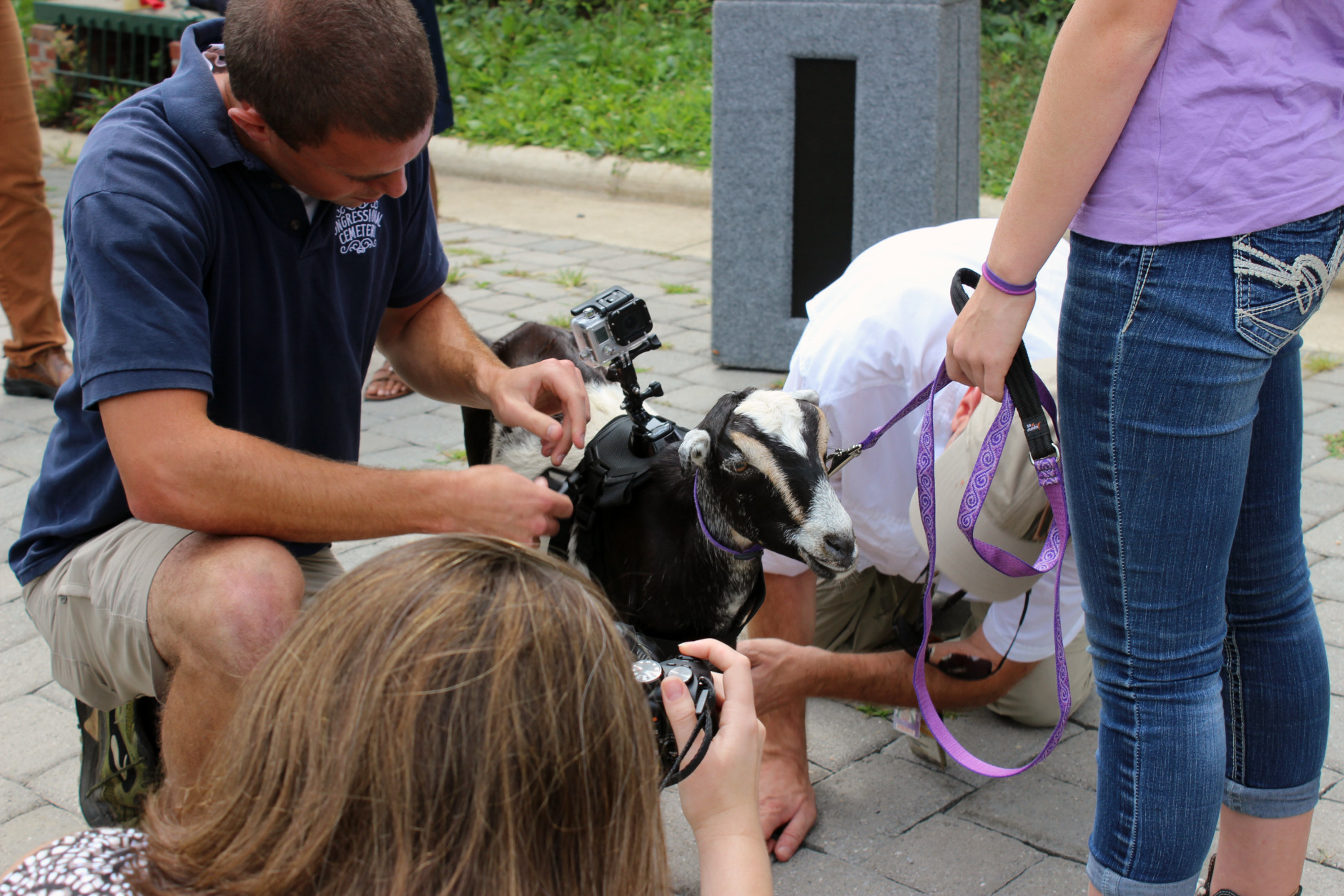Chomp, Chomp — Goats chew up invasive plants at Congressional Cemetery
About 30 goats from Browsing Green Goats of Calvert County, Maryland, started chowing down on invasive plant species this week at Historic Congressional Cemetery in...

As part of Congressional Cemetery’s social media efforts, Daniel Holcomb, left, the cemetery’s grounds and conservation manager, attaches a “Goat-Pro” camera to one of the goats. People can look for the videos on the cemetery’s Facebook page.
(Photo by Michael O’Connell/Federal News Radio)
Historic Congressional Cemetery kicked off it’s two-week brush-clearing program along the edge of its property located near the Anacostia River, with the help of Browsing Green Goats of Calvert County, Maryland.
“We employed a herd of goats here to take care of vegetation issues,” said Lauren Maloy, the cemetery’s program director. “They’re located on the perimeter of the cemetery and they’re going to be here for the next few weeks getting rid of our kudzu, invasive vines, poison ivy, which in turn, can endanger our historic trees and our historic headstones.”
This is the second time in three years that the cemetery has turned to goats to help it with its brush-clearing efforts.
“They will never be on the actual graves inside the cemetery, just on some extra land that we have,” said Daniel Holcomb, the Historic Congressional Cemetery’s grounds and conservation manager. “It’s undeveloped and they’re just helping us manage it. The problem with clearing it out by human power is that when all these vines are cut all the seeds drop and regrow almost immediately. Using a chemical treatment down here would kill the seeds, but we’re right next to the river, so it would not be good for the environment in that respect.”
Browsing Green Goats started out about five years ago, renting out goats to a golf course for grounds keeping.
“We have about 40 goats at the moment, 30 to 35 are here at this cemetery,” said Jacqueline Bowen, 15, who runs Browsing Green Goats with her mother, Mary Bowen.
She said one of the advantages of using goats to clear the brush is that their stomachs are able to break down the seeds of the invasive plants they eat.
Cemetery is a nearly forgotten D.C. landmark
Historic Congressional Cemetery is the only place where someone can be interred in a site that was part of L’Enfant’s 18th century design for city. Despite it’s long history in the Nation’s Capital, it’s not as well known as some of the other local landmarks.
“We’re sometimes forgotten in the D.C. tourist guidebooks,” Maloy said. “But we think of ourselves as the first national cemetery. Congressional Cemetery was founded in 1807. Within the first few months of it being established, congressmen and senators started to be buried here, hence the name.”
Significant individuals buried at the cemetery include Civil War photographer Matthew Brady, rewound conductor John Philip Sousa and former FBI Director J. Edgar Hoover.
“We really like that when we have these kind of high-profile things, like the goats, that people come out and see them, but also realize this is a really important part of the history of D.C.,” she said.
Aside from Hoover and members of Congress, the cemetery, which is privately owned, has served as the final resting place of many civil servants over the years.
“We’re very closely associated with government from our start, basically, because of our proximity to the Capitol,” Maloy said. “Back then, the transportation was awful. Embalming was basically unheard of, so they decided to start putting their remains here. That tradition continued to the end of the 19th century, but we enjoy close ties, obviously, with Capitol Hill today.”
Maloy is also the director of the Association for the Preservation of Historic Congressional Cemetery, which raises money through its various programs to help preserve the cemetery.
“A lot of people know us for the K9 Corps,” she said. “It’s our dog-walking membership program. So, people pay to walk their dogs off-leash here. It is a donation, which goes back into cemetery. Most days if you come here, you’ll see dogs running all over, enjoying the grounds as well.”
The goats will be at the cemetery for the next few weeks. Admission is free and the property is open to the public from dawn to dusk.
“They’re going to be here for the next few weeks,” Maloy said. “So please come in. Grab a program. Come see the goats, but also come back please.”
Copyright © 2024 Federal News Network. All rights reserved. This website is not intended for users located within the European Economic Area.
Michael O’Connell is senior digital editor of Federal News Network optimizing content for the best user experience. Follow @moconnellWFED
Follow @moconnellWFED




